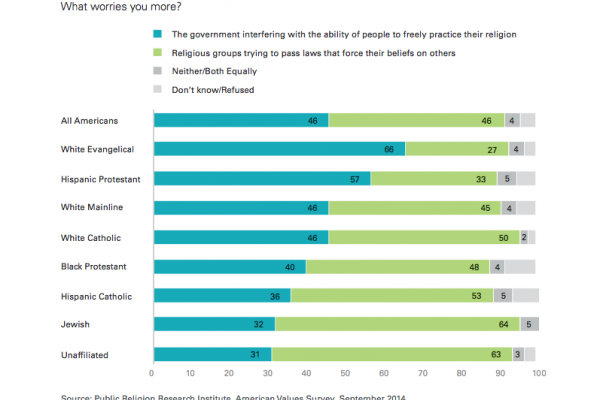When it comes to concerns over religious liberty, Americans are divided as to which is in more imminent danger: the ability to practice one’s religion without government inference, or the consequences to freedom of others enforcing their own religious beliefs on others. According to the 2014 American Values Survey, released Tuesday from the Public Religion Research Institute, nearly half of Americans (46 percent) say they are more concerned about religious groups trying to pass laws that force their beliefs on others. An equal number (46) say they are more concerned about the government interfering with the ability of people to freely practice their religion.
When broken down, these numbers strongly reflect generational and partisan divides — nearly 6-in-10 Democrats worry about religious groups trying to pass laws to enforce their beliefs on others, while approximately two-thirds of Republicans and those who identify with the Tea Party worry about government interference with their ability to practice religion. There is also a “notable generation gap” on this issue, with 52 percent of young adults concerned about religious groups enforcing their belief and an equal number (52 percent) of those over the age of 65 are concerned about government interference.
Interestingly, while the survey notes “few divisions” on this question by race or class, religious affiliation reveals big divisions. White Evangelical Protestants are by far the most concerned about the government interfering with people’s ability to practice religion (66 percent), while Jewish Americans and religiously unaffiliated Americans are far more concerned about others enforcing their own beliefs (64 and 63 percent, respectively). And while other religious groups are more divided, Catholic subgroups break down by age and gender lines (55 percent of Catholic women worry about religious groups enforcing their beliefs on others while Catholic men are evenly divided).
As indicated by the Burwell vs Hobby Lobby Stores Supreme Court ruling in June and last week’s de-recognition of InterVarsity Christian groups in California, perception among white evangelicals of religious liberty as government infringement has real-time consequences. Coupled with the rise of the ‘nones’ and the concern among many religious groups over enforcing religious beliefs on others, the divided tenor of religious liberty concerns among religious groups looks to continue.
Got something to say about what you're reading? We value your feedback!
